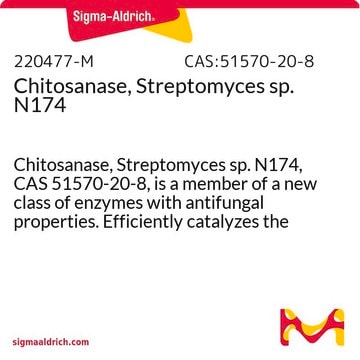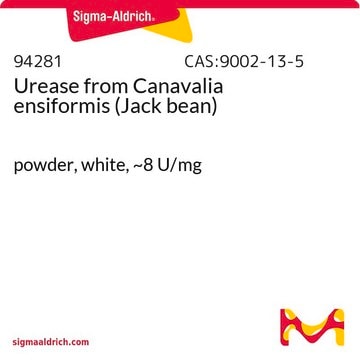C9830
Chitosanase from Streptomyces griseus
lyophilized powder, >50 units/mg protein (Bradford)
Sinónimos:
Chitosan N-acetylglucosaminohydrolase
About This Item
Productos recomendados
form
lyophilized powder
Quality Level
specific activity
>50 units/mg protein (Bradford)
purified by
chromatography
solubility
H2O: soluble, clear to slightly hazy, colorless (10U/0.3mL)
foreign activity
chitinase <1.0 units/mg protein
storage temp.
−20°C
General description
Application
Biochem/physiol Actions
Unit Definition
Physical form
Preparation Note
Other Notes
signalword
Danger
hcodes
pcodes
Hazard Classifications
Resp. Sens. 1
Storage Class
11 - Combustible Solids
wgk_germany
WGK 1
flash_point_f
Not applicable
flash_point_c
Not applicable
ppe
Eyeshields, Gloves, type N95 (US)
Certificados de análisis (COA)
Busque Certificados de análisis (COA) introduciendo el número de lote del producto. Los números de lote se encuentran en la etiqueta del producto después de las palabras «Lot» o «Batch»
¿Ya tiene este producto?
Encuentre la documentación para los productos que ha comprado recientemente en la Biblioteca de documentos.
Los clientes también vieron
Artículos
Uncover more about glycosaminoglycans and proteoglycans including the structure of glycosaminoglycans (GAGs), the different types of GAGs, and their functions.
Nuestro equipo de científicos tiene experiencia en todas las áreas de investigación: Ciencias de la vida, Ciencia de los materiales, Síntesis química, Cromatografía, Analítica y muchas otras.
Póngase en contacto con el Servicio técnico









